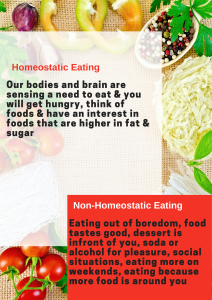The overwhelming majority of people regain the weight that they have lost over the long-term.
A 2001 study out of the American Journal of Clinical Nutrition concluded that 4.5 years after completing a structured weight-loss program, with or without exercise, the average weight loss maintained was 6.5 pounds (representing a 3.2% reduction in initial weight) (1).
Losing weight isn’t the issue, that’s the easy part. But the hardest part always seems to be keeping the weight off and less than 3% of people maintain their weight loss.
So why is it so hard to keep the weight off after a weight loss phase?
Well, there are some metabolic, psychological, environmental, sociological, and physiological things going on that cause us to overeat post weight loss diet.
But don’t worry, we’re here to help you and give you some practical take home strategies to implement right away.
One of the major reasons you overeat and get fat is due to your food reward system (2), see infographic below:
Our bodies have these peptides and hormones located in the central hypothalamus (brain), peripheral gastrointestinal tract (stomach), pancreas, and fat cells, where all four of these regulate appetite. (3)
Some of these we can control through strategies we will talk about at the end and some of these, you have no control over.
Here’s what we mean: (2, 4)
- Homeostatic Eating- Eating because of a perceived energy (calorie) need for the body (circuits in brain that regulate energy availability in body and circuits are activated when they think you have low energy stores and will drive hunger, interest in food, and thinking of foods)
- Non-Homeostatic Eating- Eating despite the fact that there’s no energy (calories) need by the body (eating just because you want it, food tastes good, desert is there, social situation, soda or alcohol for pleasure, eating on weekends, eating because more food is around you, or anxiety)
The non-homeostatic pathways can override the homeostatic system very easily, increasing the desire to eating palatable energy-dense food (high fat, high sugar, salty, and processed foods) even when energy stores and food supply are abundant.
Practical Ways to Not Overeat and Regain the Weight Back
- Exercise regularly. Probably better to really focus on progressive resistance training to help with nutrient partitioning and building muscle mass
- Continue to be active outside of regular exercise and cardio such as more frequent walks so you can expend more calories throughout the day (5)
- Try doing some form of light exercise or activity before eating a meal. There’s something to be said when we workout, we feel better and healthier and thus dont want to overeat
- Hire a personal trainer or online coach to be accountable to and have them design you a customized exercise and nutrition program
- Manage stress levels to avoid stress eating
- Get sufficient sleep since research shows you tend to make poorer decisions when sleep deprived, in this context you will go for quick-easy and highly palatable foods
- Keep a high protein diet to help with satiety (staying full) so you wont overeat
- Focus on whole and minimally refined foods (lean-high quality protein sources, starchy carbohydrates, fruits, vegetables, and healthy fat sources) and reduce palatable high calorie foods (processed and packaged foods)
- If you know you give in easily for sweets, then don’t keep them in your kitchen or pantry, this way you aren’t tempted when you see or smell them
- Remove trigger foods, these are foods you absolutely know that if they are in sight, you will snack or overeat
- Have a planned high carb day or indulgence meal to still attend social events, have some non-traditional foods, eat out, etc.
- Slowly add calories back in overtime depending on your goals if you are coming off a dieting phase
- Frequent self-monitoring (i.e., pictures, measurement, weighing yourself, and tracking your daily food intake)
- Do not eliminate food groups or foods, keep flexibility, and variety at the forefront
- Have balance in your life (family, fun, activities), anything non-training and nutrition
Want to Put an End to the Weight Regain?
You just learned why you’re overeating and getting fat. Want to learn 2 more health industry secrets that we reveal?
Learn more HERE
References:
- Anderson et al. Long-term weight loss maintenance: A meta analysis. 2001
- “The Hungry Brain.” Stephan Guyenet. 2017
- Sumithran, P. Proietto, J. The defense of bodyweight: A physiological basis for weigh regain after weight loss. 2013
- Kenny, PJ. Reward mechanisms in obesity. New insights and future directions. 2011
- Kleist et al. Moderate Walking Enhances the Effects of an Energy-Restricted Diet on Fat Mass Loss andSerum Insulin in Overweight and Obese Adults in a 12-Week Randomized Controlled Trial. 2017


